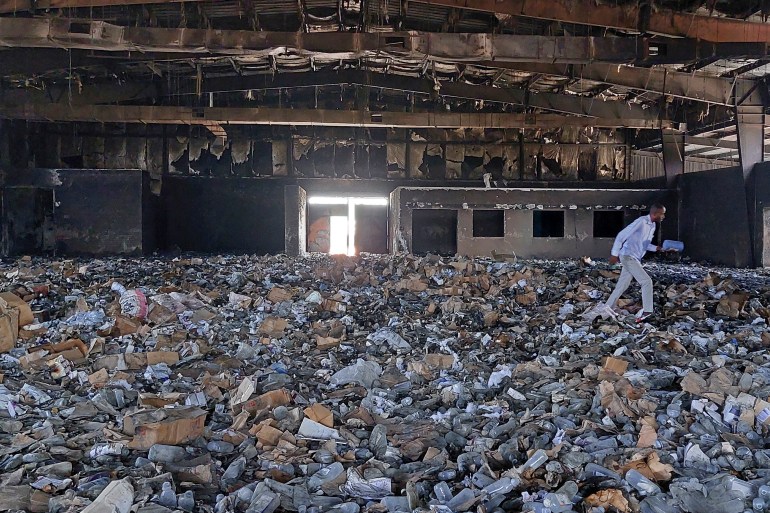The vicious battle between the Sudanese military and the paramilitary Fast Assist Forces (RSF) has hit the two-month mark, with hostilities exhibiting no indicators of winding down regardless of a dire humanitarian state of affairs that has left greater than half the nation in determined want of help.
Sudan was plunged into chaos in mid-April when a deepening energy wrestle between military chief Abdel Fattah al-Burhan and RSF commander Mohamed Hamdan “Hemedti” Dagalo exploded into an all-out battle.
Since then, the nation has sunk deeper into disaster.
Complete neighbourhoods within the capital, Khartoum, have been destroyed and deserted after greater than 1,000,000 residents fled. Within the western area of Darfur, the preventing has taken by itself ethnic dimension, pitting Arab in opposition to non-Arab communities in a terrifying echo of the violence that made it synonymous with battle for 20 years.
The battle has compelled some 2.2 million folks from their houses, together with 528,000 who have sought refuge in neighbouring nations, based on the United Nations, which estimates that 25 million folks want humanitarian help.
Figures by the Armed Battle Location and Occasion Knowledge Challenge put the loss of life toll at greater than 2,000 folks, however the actual quantity is feared to be a lot larger.
Here’s what it is advisable to know concerning the ongoing preventing:
The way it started
On April 15, residents of Khartoum woke as much as chaotic scenes as armoured autos from each forces careered via the streets, with heavy artillery hearth ringing all through the town and fighter jets roaring within the skies above.
Quickly, the loss of life toll started to rise and a number of hospitals have been shortly put out of service because the battles intensified.
Preventing additionally unfold throughout the nation, together with in Merowe, a northern metropolis on the best way to the Wadi Halfa border crossing with Egypt that has huge gold mines and a navy airport, in addition to an necessary reservoir on the Nile River.
Nevertheless it was conflict-weary Darfur, the place Arab and non-Arab communities have lengthy fought over scarce water and land assets, that has seen among the worst violence, together with the indiscriminate killing of civilians, the ransacking of hospitals and the burning of total neighbourhoods.
The battle has dashed the heady hopes for democracy that emerged after a well-liked rebellion led to the removing of longtime President Omar al-Bashir in 2019. Two years later, the 2 generals whose forces at the moment are preventing one another orchestrated a coup that ended a fragile power-sharing settlement between the navy and civilian leaders that was supposed to guide the nation to elections. However rifts swiftly started to appear amid disagreements over a restructuring plan that may see the RSF built-in into the common military.
The battle has involved many worldwide gamers, together with Russia, the US and regional powers, all of whom are vying for affect in Sudan.
Members of the worldwide group early on heaped strain on the warring sides to name a ceasefire. Saudi Arabia and the US brokered “pre-negotiation” talks within the Saudi coastal metropolis of Jeddah between the military and the RSF, urging the belligerents to comply with an enduring ceasefire.
Each side attended, talking liberally about how dedicated they have been “to making sure the safety of civilians”, however one ceasefire after one other was breached, with the 2 accusing one another of violations. On Could 31, the military suspended its participation within the talks.
Humanitarian disaster, evacuations
Sudan is grappling with acute shortages of important gadgets equivalent to meals, clear water, medicines and gas.
Costs have skyrocketed on account of the shortage, exacerbating the plight of the inhabitants.

Port Sudan, a metropolis by the Crimson Sea in japanese Sudan, grew to become a hub for foreigners and Sudanese folks seeking to be evacuated in addition to a refuge for these displaced by the preventing.
Whereas the evacuation effort grabbed the world’s consideration, little consideration was paid to the Sudanese left behind, together with these whose passports have been destroyed or left locked up by embassies they’d utilized to for journey visas.
Others travelled to Egypt, Ethiopia and Chad, forking out enormous sums for bus tickets or strolling for days and enduring treacherous journeys.
These trying to enter Egypt needed to endure via days-long waits on the Halfa border crossing as approvals have been gradual to return via.
To make issues worse, the Egyptian authorities on Sunday introduced it was making it obligatory for all Sudanese to acquire visas earlier than crossing the border.
Preventing ongoing
As each the military and the RSF see the battle as an existential wrestle to the bitter finish, there aren’t any indicators that the preventing will finish any time quickly.
After the newest – and solely comparatively strong – 24-hour ceasefire ended on Sunday, observers anticipated the military would double down on attempting to take components of Khartoum held by the RSF.
Preventing within the capital reignited intensely on Sunday after the temporary 24-hour respite.
In the meantime, ethnic killings within the troubled West Darfur area have had a menacing impact on civilians.
And on Wednesday, West Darfur’s Governor Khamis Abakar was killed hours after he accused the RSF and allied fighters of “genocide”.
The military accused the RSF of “kidnapping and assassinating” the governor, however the group blamed the killing on “outlaws amid the persevering with tribal battle within the state”.
